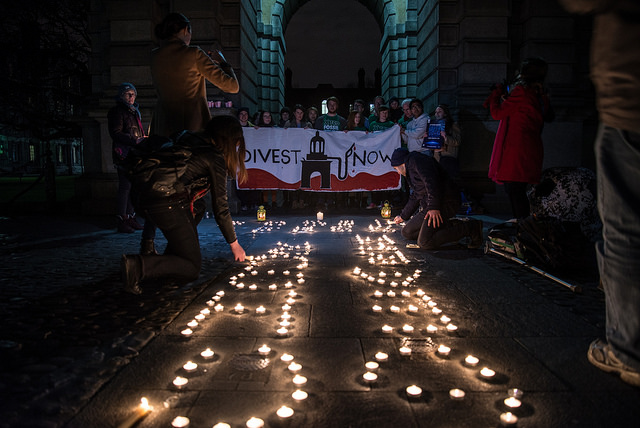Fossil Free TCD has been making news around campus lately, and for good reason. This afternoon, news broke that Trinity is to divest from its €6.1 million indirectly invested in fossil fuel companies. This announcement came about after a year-long campaign led by Fossil Free TCD that sought to raise awareness about divestment and the importance of reducing fossil fuel consumption. From actively discussing the issue of divestment with both the College Board and students to simply giving budding activists a springboard upon which to get involved with other projects, the campaign started off small but grew, and always remained vocal. In the wake of their success, the campaign has become a remarkable example of the ability of students to implement positive change through activism.
Speaking to The University Times earlier this week, three members of the group, Colm Tong, Cillian Crosson and Hugh Conlon, discussed their work with Fossil Free TCD and were eager to stress that they do not have a hierarchical structure in their campaign. Each has gotten involved in a different way, with Tong initiating the campaign in Trinity last September. Crosson joined after realising “just how vital it is that we take action”, seeing Fossil Free TCD as this “concrete thing that I, as a student, could do”.
Conlon explained the day-to-day work of the campaign, noting how work is divided into team, like a media team or a creative action team. He describes it as “quite fluid”. A recent creative action initiative taken on by Fossil Free TCD was “Sell the Kells”, where people were asked to sign a petition to sell the Book of Kells and invest more in fossil fuels, an interesting and “more engaging way to get people to actually consider it”. It highlighted how much Trinity already invests in fossil fuels – a staggering €6.1 million. The aim of these campaigns is to “frame the issue” and help people understand the importance of the group’s goal.
Moving to the “epicentre” of the worldwide environmental campaign, the group is currently lending support to the Standing Rock movement in Dakota. They recently held a solidarity event in Front Square with a 10-minute silence. This was a very visible event, and sums up the campaign as a whole as they recognise the importance of global climate issues. According to Tong, contacts in Standing Rock have expressed their gratitude to Fossil Free TCD. This emphasises just how far reaching and universal the aims of the campaign are.
The importance of the Fossil Free TCD campaign lies with “stigmatising the fossil fuel industry”, according to Conlon and that “if a big institution like Trinity is taking its money out of fossil fuels it might encourage others”. Tong emphasised the importance of drawing attention to the “stark science behind climate change and the commitments that all the countries around the world have made in Paris”, referencing the climate talks that took place last year. They have committed to stay below two degrees of global warming, and in order to do that they must leave approximately 80 per cent of fossil fuels in the ground.
However, Tong explained that: “At the same time, fossil fuel companies are investing trillions of dollars into exploration for more reserves. For Trinity to be invested in fossil fuels is in direct contrast to the commitments we made in Paris.” This frustration is painfully understandable, as we “can’t have both”. The removal of investment in these industries therefore signifies that we support the global ideals of limiting global warming.
Since the campaign is centred around activism, Crosson remarked that Fossil Free TCD does a lot to help people get involved in activism in general, stating that “there’s such an energy from young people because it’s giving them a concrete way to get into activism”. They all agreed that they’re almost “churning out activists” and have even set up a student network of activists in Ireland. Climate change activism, as Tong put it, is a “gateway drug to the whole wider spectrum of activism”.
Along with getting Trinity to divest, Fossil Free TCD also hopes to encourage even more activists and promote wider divestment. After achieving their aim, they now hope to “keep these people involved and feel like they can contribute to something else”.
Working with College has been a “nice surprise”, and they have been “really receptive and open to hearing student voices”. Crosson explained that there is a “platform to air our grievances”. Talking about their meeting with College’s senior management, Tong explained they weren’t criticising the university but instead are “trying to point out something that we believe to be immoral, unethical and financially unsound”.
In succeeding to encourage Trinity to divest from fossil fuels, Fossil Free TCD have ensured that this very important conversation about divestment will reach more and more people, both in Trinity and beyond. Their work also acts as a reminder to students of their power to implement positive change, and of the merits of getting behind an issue, whether it be environmental or not, at a student level.







